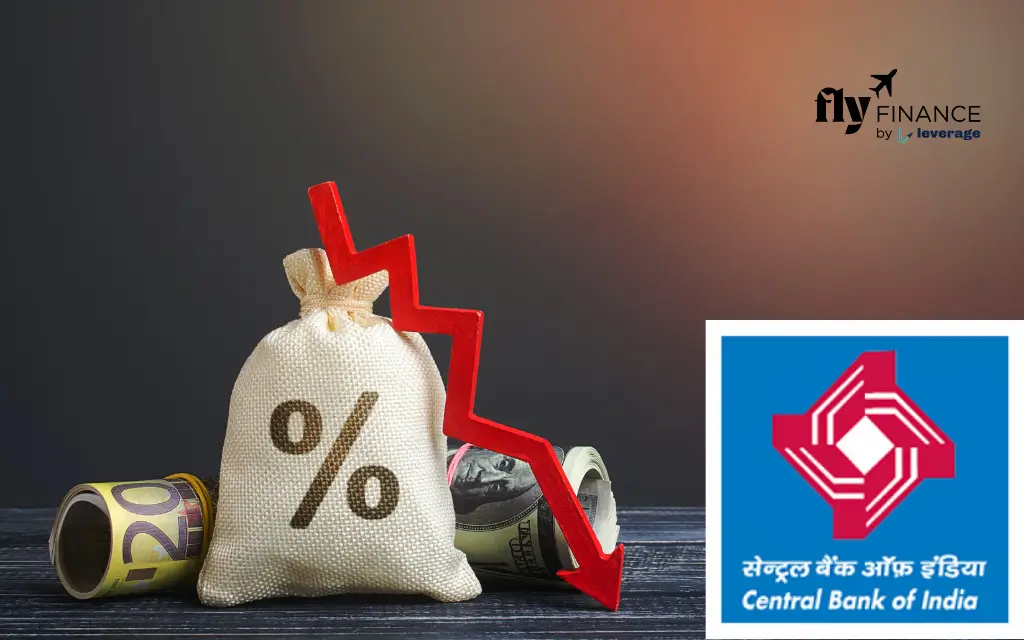Central Bank is one of the major public sector banks in India. The bank offers education loans to study abroad as per the IBA model of education loans. You can get up to INR 7.5 lakh education loan without collateral. The students can apply for the loan through the Vidya Lakshmi Portal Central Bank Education Loan. The interest rate is determined based on the repo rate as directed by RBI and the additional spread fixed by the bank itself. The rate of interest also depends upon the credit score, loan amount, repayment period, income of the borrower etc. Check all the details on the Central Bank education loan interest rate and how it is calculated.
Table of contents
What is the Central Bank Education Loan Interest Rate?
Central Bank provides education loans for overseas studies under its Cent Vidyarthi Scheme. The loan is provided for education in top-rated management, engineering etc courses abroad. Currently, the interest rate is 10.30%. However, this may increase depending on the RBI guidelines on education loans and economic conditions in the country. The interest rate on the education loan stated above is applicable for the loan provided by the Central Bank under the Cent Vidyarthi D category scheme. The D-category includes all the top global medical, engineering and management institutes.
Also Read: Want to get a quick education loan online? Check here YONO SBI Education Loan to Study Abroad
Interest Rate Calculation
Central Bank determines the interest rate on education loans by adding the repo or RBLR (repo-based lending rate) with the spread as decided by the bank’s internal policy in line with the directions of RBI. Also, the interest rate may fluctuate based on the loan amount. For loans up to INR 7.5 lakhs the bank might charge a higher interest rate and for loans above 7.5 lakhs, the interest rate might be lower. Check the calculation of the education loan interest rate below:
For example, if the RBLR is 9.35% and the spread determined by the bank is 0.95%, the interest rate will be 10.30%.
RBLR (9.35%) + Spread (0.95%) = 10.30%
Factors Affecting the Interest Rate
There are certain factors that affect education loan interest rates like credit score, loan amount, repayment period, type of loan etc. You must check all the schedule of charges and interest rates stated by the bank before initiating the Central Bank Education Loan disbursement process. Check all the details on major factors affecting the interest rate below:
Credit Score
The credit score, which reflects your creditworthiness, is a significant factor influencing the education loan interest rate. The credit report shows the record of all the past loans and repayment behaviours. Banks in India offer lower interest rates to individuals with higher credit scores, as it indicates a lower risk for the bank in terms of loan repayment.
Loan Amount and Tenure
The amount you borrow and the duration for which you take the loan can impact the interest rate. Generally, larger loan amounts or longer repayment periods might result in slightly higher interest rates, as they present a higher risk for the bank. However, some banks offer a low rate of interest on loans above INR 7.5 lakhs.
Also Read: Insurance is an important factor which you should consider while taking a loan. Check here all about SBI RiNn Raksha Education Loan Insurance
Type of Course and Institution
The nature of the educational program and the reputation of the institution also influence interest rates. Banks may differentiate between professional courses and general degrees, offering different rates based on career prospects. Loans for studies in reputed institutions abroad might have low interest rates.
Co-applicant and Collateral
Having a co-applicant with a stable income or providing collateral (like property or investments) can influence the interest rate. It provides the bank with additional assurance regarding loan repayment, and so the banks offer low interest rates. Usually, interest rates on unsecured loans are slightly higher than on secured education loans.
Economic Conditions
The overall economic situation in India can affect education loan interest rates. Economic stability, inflation rates, and the prevailing interest rate scenario set by the Reserve Bank of India can impact how banks determine the interest rates on education loans. When the inflation rate gets higher, the RBI increase the repo rate, thus making the borrowings or loans costlier.
FAQs
Central Bank provides education loans at a 10.30% interest rate to study abroad. However, this may vary based on your credit score, income, repayment period etc.
The interest rate is determined by various factors such as type of course and institution, economic conditions etc.
The Central Bank determines the interest rate on education loans by adding the spread with RBLR.
As the Central Bank is a public sector bank and follows the IBA model, it may provide a discount of 0.5% on the interest rate to female students.
Yes. You can make a request to secure an education loan at a floating interest rate or fixed interest rate, whichever you want. However, the approval of such requests is subject to the bank’s internal policies.
This was all about Central Bank education loan interest rates. Always go through the loan agreement and check all the terms and conditions of the education loan.
To know more about education loans, the best bank accounts for students, forex and banking experience for global students or international money transfers, reach out to our experts at 1800572126 to help ease your study abroad experience.
| Related Blogs |
| Inflation and its Affect on Education Loan |
| How to Get Collateral Free Education Loan for USA |
| Best Forex Card to Use in Australia |
Follow Us on Social Media





























